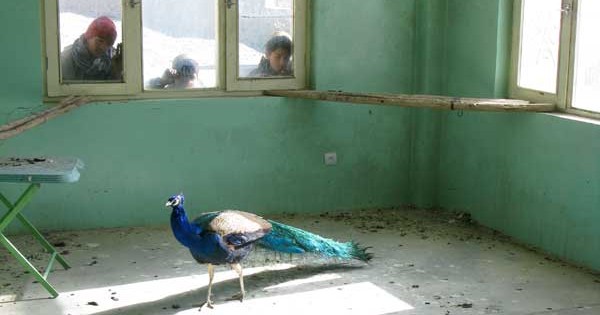
PAKTYA PROVINCE—The room is full of old men who remember the Russian war. They sit on couches wearing long, loose shirts and pants, and are wrapped in blankets that reflect the colors of the landscape—gray, beige, coffee. Black turbans on their heads coil like cloth serpents.
Nor far away lies the home village of Jalaluddin Haqqani, one of NATO’s most violent enemies, and some of these men are probably related to him. They are from the far-out villages and have come to the local government center to meet with American soldiers and argue and ask for things. Demand, threaten, beg. It all takes place in Pashto, which I don’t understand. So I drift. An elder to my right doesn’t seem to pay attention either. He thumbs caramel-colored prayer beads. They click softly as he spools through them, the sound of prayers rising to heaven.
Outside a peacock marches through the sunlit courtyard. It is the most colorful anything anywhere. All else is dull and covered in dust: the little glass tea tables, the red carpets, the wool rug bearing President Hamid Karzai’s likeness. All of my clothing, the inside of my mouth, dust. I look at the soldier sitting next to me and he too is dusty. His radio, ammunition clips, vest, rifle, and helmet. Even his eyelashes are blurred with it, as though he had sat still for a year.
The elders have stopped talking. They listen to a soldier explain to them for the third or fourth time how the new system is supposed to work.
“You can’t come ask us to build you a madrassa or a clinic or a well anymore,” the soldier says. “You have to go to your own government.”
It is the language of leaving, of withdrawal.
But it doesn’t work. No matter how many times the soldier says it, the elders pause and then repeat a list of things they want. A madrassa, a clinic, a well. The soldiers can do nothing; the message does not sink in. They say it again anyway, because that’s what they must do. No, you can’t come to us … and the cycle is old and new, beginning and ending.
So I drift.
The room smells like unwashed men and it is very cold and I am slowly freezing. My toes numb down, my fingers. If I’m not careful I will fall into a cold sleep. Some of the tea glasses have been drained, the others steam like little engines, the tea yellow and the cubed sugar unmelted at the bottom. Against the wall sits a plastic lemon tree, its petroleum-based fruit slightly less radiant than the peacock outside.
“But we need a project,” one of the elders is saying.
“Well, we need you to stop shooting at us,” one of the soldiers replies.
“We cannot do anything about the Taliban.”
“How about we go to your village and have a meeting?” the soldier offers.
“No. If I bring you there, they will cut off my head.”
I am remembering these events out of order—not that it matters. It is all true and everything is confirmed, the circular nature of all this talk, the great swirling problems of this place, the whirlpool that is Afghanistan. I hear it in every province. I am waiting for the whirlpool to swallow us all, but it doesn’t. My eyelids begin drooping, and I startle myself awake. It would be pretty bad if I fell asleep here.
A young policeman brings more tea. His hands are long and slender, a girl’s hands. His nails have been painted red with henna. Though he wears a uniform, he does not have the rough disheveledness of the other policemen. He is too delicate. Possibly he is not meant for police work at all but for some far other thing. I look at my own hands and the skin is dry and alligatored. Little red spots appear where it has split open from sun, wind, and cold. I remind myself again to do something about this, and then I try to remember the last time I saw a pretty girl. I try to remember her hands.
Suddenly the elders stand and remove to the sunlit courtyard. I get up, too, and walk out. They squat on their ankles in a circle, violently discussing something, throwing fingers, voices rising and falling in waves. What is the Pashsto word for well? I think they must be shouting it at each other over and over.
I look for the peacock. It has stepped into a room off the courtyard. I follow. The room is a mess, bird droppings and straw and bits of leftover food too ignoble for the cock to eat. This is its home; whoever cares for this bird as a pet keeps it here, in a room of its own. It preens in a corner, the green-blue eyes of its tail staring at the ceiling, at nothing.
Through a set of dirty windows, children peer in at the peacock. They are not as pretty. They are covered with dust and probably have not washed in a long time. They are like shadows at the window. The peacock ignores their tapping, their shouts. Not even the cock’s tail-eyes glance at them. The bird seems to understand that it is too pretty for this place. Like a young film star flush with her first success, the critics generous, the fans adoring. Tomorrow does not exist.
In the courtyard, the elders have stood and are heading back toward the couches. I go back, take my place, and ask the elders if they understand this new construction project system the Americans have devised for them. They do not even answer. Instead, they begin describing their fantasies again, listing things they want—a well, a clinic, a madrassa. These old men who remember the Russians. Their faces eroding, the furrows in their skin same as the furrows in the hills.

